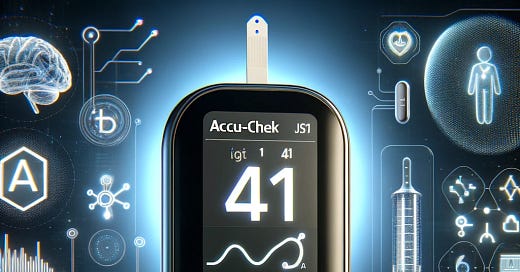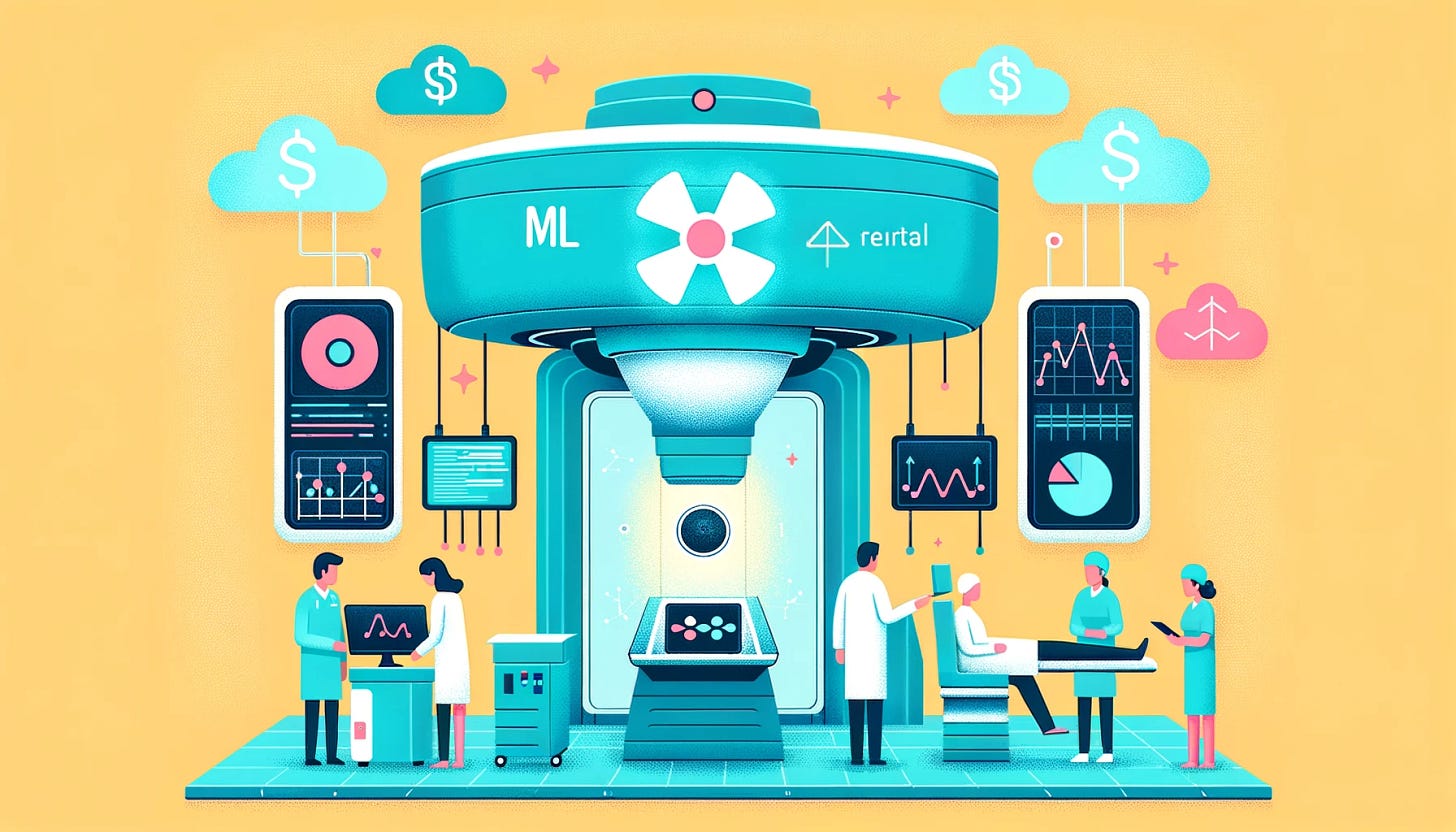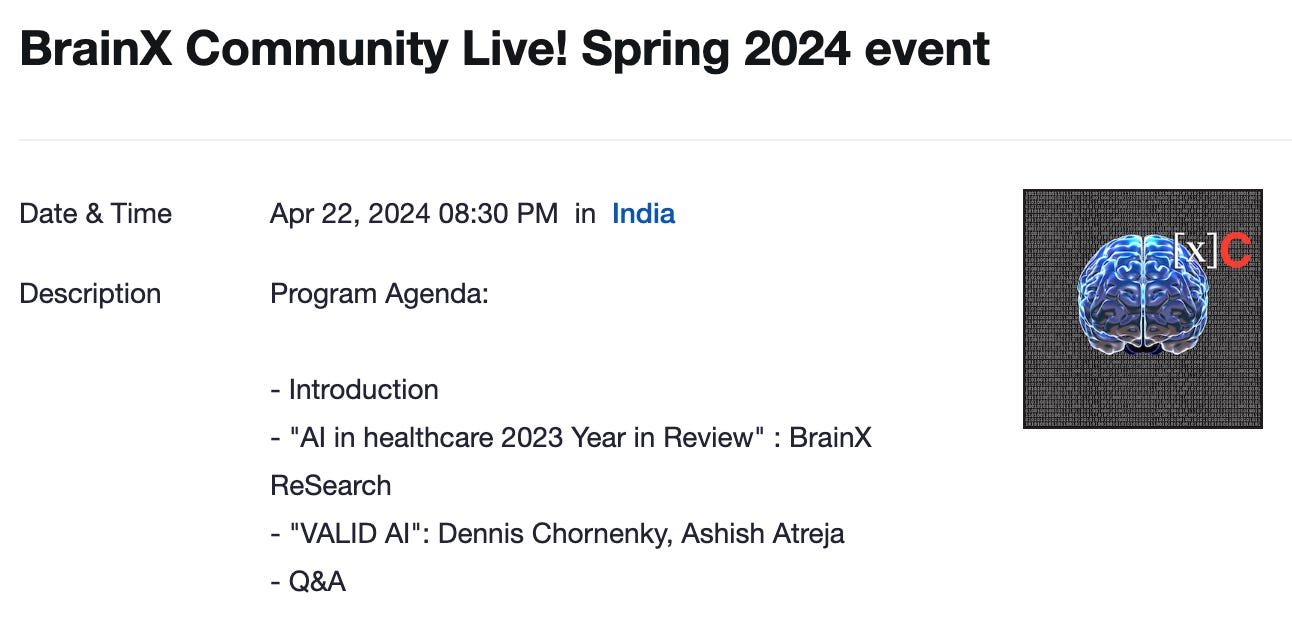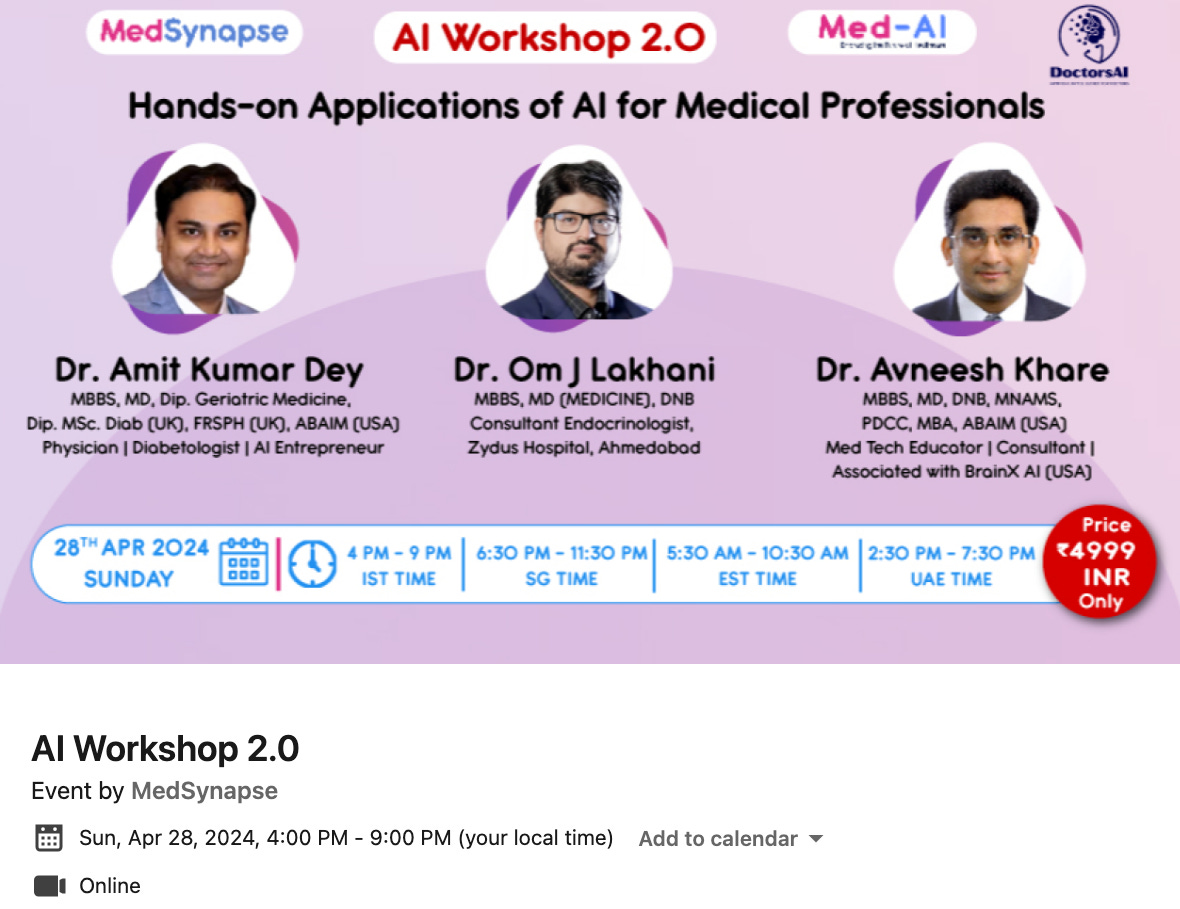🚀 AI Frontiers: 💫 Transforming Medicine from 🩸 Glucose Monitoring to 🤖 Combating Loneliness
Updates on Artificial Intelligence & Emerging Technologies in Medicine 🤖🩺🚀
“The superpower of these AI systems is that they can look at all of these large amounts of data and hopefully surface the right information or the right predictions at the right time.” - Finale Doshi-Velez, John L. Loeb Associate Professor of Engineering and Applied Sciences at the Harvard John A. Paulson School of Engineering and Applied Sciences (SEAS)
Dear Med AI Enthusiast,
Welcome to The ‘Med AI’ Capsule weekly newsletter, your inside look at how artificial intelligence and emerging technologies are transforming medicine.⚕
Whether you're a medical professional 👩⚕️, a technology enthusiast 💻, or simply someone with a curious mind 🧠, The 'Med AI' Capsule is designed for you.
It helps you stay informed 📰 about the latest groundbreaking updates and offers insights into the rapidly evolving world 🌍 of artificial intelligence and emerging technologies in medicine.
Let the adventure begin! I'm thrilled to have you along for the ride. 🚀
In today’s capsule:
5 News Updates (1 Deep Dive)
4 Research Updates (1 Deep Dive)
3 Innovative Companies (Industry Showcase)
2 Upcoming Events
1 Knowledge Resource
Reading Time: 5-7 minutes
News Updates 📰
1. 🤖 Roche Unveils AI-Enhanced Diabetes Tracker to Foresee Glucose Levels
Roche has unveiled its innovative continuous glucose monitoring system, the Accu-Chek SmartGuide, at the International Conference on Advanced Technologies and Treatments for Diabetes in Florence, Italy.
This cutting-edge device, which is pending CE mark approval in Europe, utilizes artificial intelligence to predict blood sugar fluctuations from 30 minutes up to two hours in advance, aiming to provide users with vital insights to manage diabetes more effectively.
Why Important: The Accu-Chek SmartGuide aims to transform diabetes management through AI-driven glucose forecasts, empowering proactive therapy adjustments to minimize complications.
“Providing users with predictive capabilities will empower them to proactively adapt their therapy so they can maintain optimal glycemic control and prevent dangerous short- and long-term complications.” - Marcel Gmuender, Roche’s global head of diabetes care
Caution: While the Accu-Chek SmartGuide system represents a significant advance in diabetes management technology, users should be wary of the risk of data misinterpretation and ensure that AI predictions from the Accu-Chek SmartGuide are used in conjunction with, not as a substitute for, expert medical guidance.
2. 👵 South Korea Introduces AI Companion Dolls to Tackle Elderly Loneliness Crisis
Hyodol's AI companion doll, designed to combat loneliness among South Korea's elderly, showcases promising emotional support and healthcare management features, though it underscores the need to balance technological solutions with privacy and human connection considerations.
3. 🔬 AI Tool Accelerates Cancer Surveillance, Offering Hope for Faster, More Accurate Diagnoses
The Path-BigBird AI tool promises near-real-time cancer surveillance by processing pathology reports to potentially eliminate the two-year lag in reporting and improve diagnoses and treatments, but any such tool necessitates careful data interpretation and stringent privacy and security measures.
4. 🧠 China Begins Trials of AI Chatbot to Aid Brain Neurosurgeons
‘CARES Copilot’ is designed to support neurosurgeons with data-driven insights and recommendations; however, reliance on a vast database of academic records for AI training raises concerns about the precision and applicability of AI-generated advice in complex, variable surgical scenarios, emphasizing the need for robust validation.
5. 👨⚕️ UK Surgeons Employ Apple VR Goggles in Groundbreaking Spinal Operation
London's Cromwell Hospital surgeons enhanced surgical precision and efficiency in a groundbreaking spine surgery using Apple's Vision Pro VR goggles, however, as we navigate this new era of medical advancements, it is crucial to ensure rigorous testing and cost-effective deployment to guarantee patient safety and healthcare equity.
Research Updates 🔬
1. 💡 Machine Learning Streamlines Radiation Therapy, Slashing Costs and Enhancing Patient Care
In an illuminating study published in NEJM AI, researchers have demonstrated how machine learning (ML) can significantly reduce healthcare costs while optimizing radiation therapy (RT) treatments.
The System for High-Intensity Evaluation During Radiation Therapy (SHIELD-RT) trial, a collaboration spearheaded by experts from various institutions, leveraged electronic health record-based ML to pinpoint patients at elevated risk of requiring acute care during RT.
By targeting these high-risk individuals for additional clinical evaluations, the study achieved a notable decrease in acute care utilization, thus mitigating expenses.
A comprehensive economic analysis revealed that ML-directed interventions not only curbed medical costs but also propelled clinical outcomes forward.
Although promising, the study advocates for further investigation to affirm the generalizability of these economic outcomes, marking a significant stride towards integrating AI into healthcare to foster both fiscal sustainability and enhanced patient treatment.
2. 👁️ Innovative Deep Learning Approach Links Retinal Imaging to Heart Health Predictions
A novel study utilizing the UK Biobank's expansive dataset has highlighted a pioneering method for predicting myocardial infarction (MI) risk through retinal imaging analyzed by deep learning, albeit with limitations regarding its focus on a Caucasian cohort and the unexplored impact of treatment on retinal measurements.
3. 🤖 AI vs. Google: GPT-4 Shines in Quality and Depth for ACDF Patient Information
Comparing Google with GPT-4 for Anterior Cervical Discectomy and Fusion (ACDF) information, a study shows GPT-4 offers higher quality but less accessible content, emphasizing the need for balance in AI-driven patient education amidst limitations like search personalization and accessibility barriers.
4. 🧠 Machine Learning Predicts Sertraline Levels in Depression Treatment
Harnessing machine learning, researchers have developed a personalized medication model to predict sertraline levels in patients with depression, showing potential for tailored treatment, though limited by its retrospective design and the need for larger, more rigorous studies.
Industry Showcase 👨🏭
Biofourmis - offers software-based therapeutics for personal predictive care. They offer the data and infrastructure required to intervene and administer treatments for chronic conditions.
Resolve Medical - provides AI-powered, cloud-based solutions to improve diagnostic accuracy in radiology. Their flagship product, RSNA, is designed to analyze medical images and assist radiologists in identifying potential abnormalities, improving the efficiency of the diagnostic process. The company aims to enhance the quality of healthcare by enabling early detection and treatment of diseases.
Atomwise - helps pharmaceutical companies with drug discovery using artificial intelligence. Specifically, they deploy deep learning algorithms to discover potential drugs and unlock undruggable targets.
Upcoming Events 🧑💻
Knowledge Resource 📚
Video: How Will AI Impact Healthcare in 2024: Predictions and Examples - Live Q&A (TMF)
The video dives into the revolutionary role of Artificial Intelligence (AI) in transforming healthcare. The discussion centers around the rapid changes in the healthcare landscape, emphasizing the need for all stakeholders to understand the upcoming shifts.
Key topics include:
Decoding Generative AI: Understanding its capabilities, limitations, and its groundbreaking role in healthcare. It explores how Generative AI differs from previous technological advancements and its significance.
Large Language Models (LLMs) in Healthcare: Examining the critical role of LLMs for healthcare professionals, such as doctors, nurses, and patients. It highlights how these models are transforming communication and information processing in the medical domain.
Future Frontiers of AI: Discussing the next breakthroughs in AI, including its evolving ability to process various data types, from textual records to images and audio, and predicting trends that will shape the healthcare landscape in the coming years.
Let’s wrap it up with an AI concept made easy! 👨🏫
Neural Networks 🤖
Neural networks in AI are like a complex system of light bulbs (neurons) that light up to process information.
Feeding data into this system activates certain paths, similar to how walking a path makes it more visible.

Each neuron layer refines the information, akin to relay race runners passing a baton, with each step bringing us closer to understanding the input, like identifying a face from basic shapes to features.
Over time, the system learns and improves, adjusting connections between neurons to make better decisions, mimicking human thought in a digital world.
Your feedback is crucial to me, as it helps me understand your interests and improve my offerings. I would appreciate it if you could take a few minutes to share your thoughts about what you've enjoyed and what you think I could do better - https://forms.gle/xpbpgVEyARWx6ZxN8
Stay tuned for our upcoming editions as we explore the latest breakthroughs and dive deep into the transformative power of artificial intelligence and emerging technologies, shaping a healthier future. 🚀
Warm regards,








